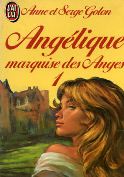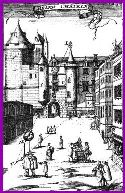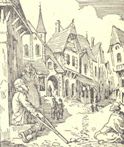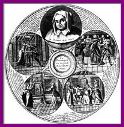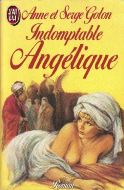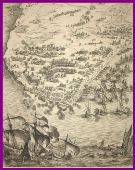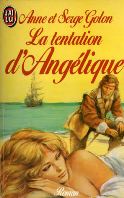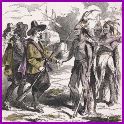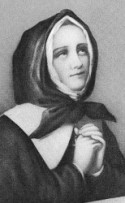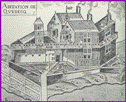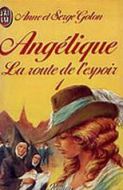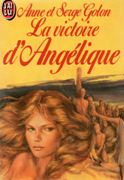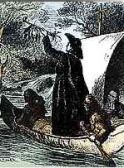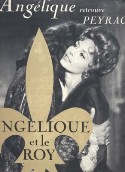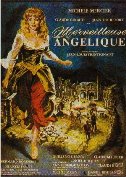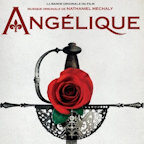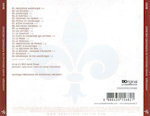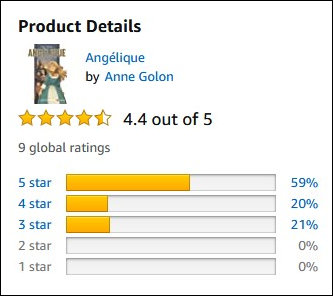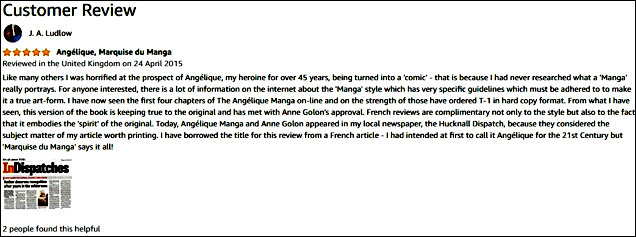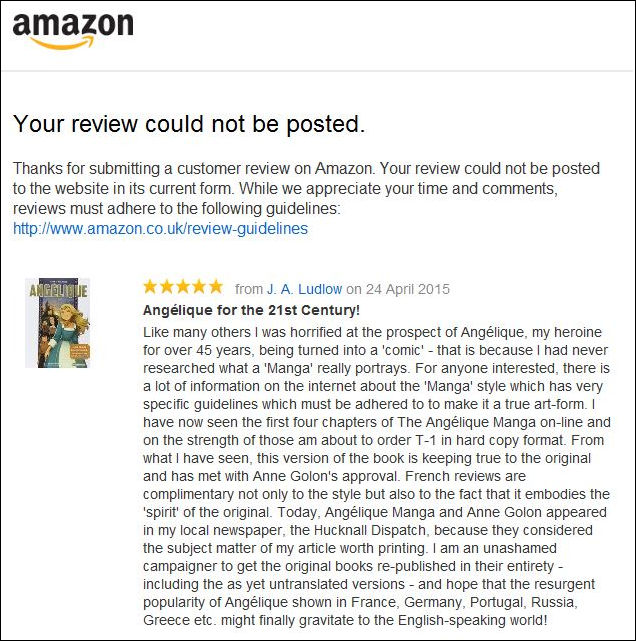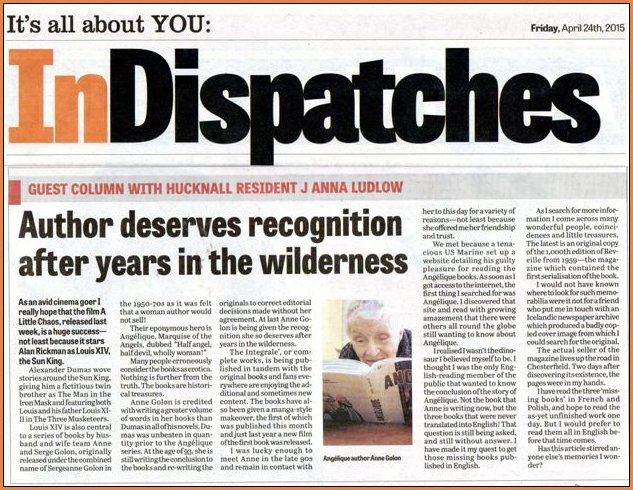Book/Manga (and film/movie) Reviews
This page is reserved for my reviews which have previously been seen on Amazon Reviews and other web-sites. In February 2015 the Monteloup reviews were added to this page.
Angélique - Marquise of the Angels
"Enormous enjoyment and educational in the historical sense" - 15th March 1999
The first time I came across the Angélique series was pretty much close to 30 years ago. They were my first insight into a sophisticated style of writing I had hitherto not experienced.
I was an avid fan of Jean Plaidy and enjoyed the historical context of her books, but found the Golons' Angélique filled not only with a rich content of French history, but realistic adventure a feeling of belonging to the books and a desire, perhaps close to addiction to know more and more and more. The addiction was assuaged by the ongoing series until it came to an abrupt end with the publication of Angélique and the Ghosts - at least in the English language.
But to return to the Marquise of the Angels and Road to Versailles - from the moment the book starts there is a familiarity and ease of reading that as the characters emerge one feels one has known all about them for a long time. The change in pace from the struggle to survive in the countryside to the outrageous riches of the Comte de Toulouse. To the intrigues, jealousies and passions of the court which wreak their terrifying malevolence and the prejudices that cause so much heartbreak. Then - sudden death - a woman whose husbands name is tarnished - becomes a persona non grata overnight, her personal history re-written - 1984 before Orwell conceived re-writing history to suit the politics of the day. The fall from grace, the depths of despair, the emotions within the alternative court "of miracles" - aptly named - the whole sequence of new characters - then out of the blue the return of Nicholas as "Calembredaine" - this thread, used by the authors, of resurrecting characters long forgotten is both magical and mischievous.
This mischief keeps me crying out for more - for a conclusion! On the strength of this tome nothing would have kept me from not wishing to read on! There is humour and pathos, a real understanding of how things were at the time - in itself an education - much has been written about Louis XIVs court - many intrigues apparent, classical authors like Dumas have woven stories about history - this modern classic takes it several stages further - it is not just story-telling it is a seminar where everyone is involved and pulled along in the wake of sensational believable story-telling. I'm re-reading the whole series now - although the paper is brown and the spines broken to pieces and pages stuck back in - and I can't wait to plunge into this world that I am so familiar with again and again. I have a great respect for the written word and pride myself on keeping my books in excellent condition (wherever possible) and have many favourites but none as sustained as the Angélique series and in particular the introductory book - which if it had not worked as well as it did - would not see us here, today clamouring for more.
Angélique - "The Road to Versailles"
"The long walk from despair back to the warmth of the sun ...." - 11th March 2008
I've recently re-read "Road to Versailles" and have been pleasantly surprised at how I was affected by this part of the on-going series. Having literally finished Marquise of the Angels and started this part I was astonished at how the authors quickly gave me a sense of isolation from the previous book. Having been drawn into the great heights of hysteria within the courtroom - suddenly here I am banished to the cold dark world of the Court of Miracles. Yes, miracles do happen down there - suddenly I am grateful that a cut-throat vagabond is the childhood friend of Angéliques and that she has at least a modicum of protection - suddenly the despair is not as desperate any more. Gradually as the adventure unfolds and things start getting tidied up - such as the safe if not uncomplicated retrieval of her children and their eventual bringing back to health the next peril appears round the corner. I'm getting exhausted here - is there never to be a happy ending? Well, that's not what we're here for at this stage - the transition between guttersnipe mother to the "I want to be a great lady again" is so subtle and sweet that it needs to be savoured like a good wine or meal. I have to say, I have been most pleasantly rewarded by re-reading this book and would wish that others might like to share that experience. It certainly bears reading over and over again, as do all the books in the series, simply because it is so easy to miss much, the first time round in the eagerness of getting on with the story and reaching its conclusion. Take the time to get properly acquainted with this particular book - it is a gem.
Rider : Just a note to say that this is my review and I don't know why Amazon have not identified me - written many years ago I should like it acknowledged now as such. I shall add this comment to all my reviews so that they can be recognised as belonging to me - J Anna Ludlow, Hucknall, Nottingham, United Kingdom - long-time fan of Anne Golon and one of the long-standing members of the Friends of Angélique. I have had the honour and privilege to have met this amazing author, had her sign several of my precious tomes, given her a complete set of the books translated into Polish [which is how I was able to read the last three books] and from the Polish versions found the missing bits in the English translations.
Angélique and the King
"Suddenly I'm transported back to the "magic" of Versailles" - 18th April 1999
I looked forward to reading this book again, knowing now that I would have the opportunity of "reviewing" it on this page. That made me think a bit more (my first 2 reviews were spontaneous and without much pre-thought) about why I have always considered this book one of my favourites of the series.
As I started to read I felt, once again, a certain frustration in the turnaround of events. That Angélique had to pursue her beautiful big cousin and finally blackmail him into marrying her (instead of him falling at her feet like so many others did). My memories of previously reading this were that she was almost betraying the memory of Joffrey, whatever her motives - this time I felt more in tune with her motivation - perhaps because I too have re-married (with no blackmail on my part let me hasten to add!)
This relationship is doomed from the start, although Philippes' demise is ironic considering his need to primp himself and at all times consider his exterior image. I have a tinge of regret for Angéliques loss but can't help feeling a bit relieved that it had to happen - otherwise how else could the rest of the series have been written? In this relationship Angélique had the sort of teasing and testing of her emotions that at a similar stage of her relationship with Joffrey had never come into play - the authors brilliantly interweave conflicting emotions in two separate relationships.
Angéliques star becomes ever brighter after the death of Philippe with the continued help of devoted servants and her allies from the days of the Court of Miracles, some of whom like her are at Versailles. She succeeds in not only preventing her own death and that of her remaining son Florimond, but manages to overpower the machinations of Montespan and put paid to her threats for the immediate future at least. The short episode of Cantor (where we meet him as a real person for the first time) was sensitively dealt with - the fact that Angélique asks for Philippes' involvement (here, he was, for once not such a resentful adolescent himself) in the decision making process made his ultimate capitulation to her all the sweeter. Angelique's memory of herself at that age also brings up another query in previous translations of these books. She refers to an incident in Marquise of the Angels when she herself had wanted to leave home - this episode is not evident in all translations. So finally - I can reveal why this book is one of my favourites - in it we are given news that we had not dared hope for, a little like Oscar Wilds "the love that dare not speak its name" - yes, I know this refers to something more specific, but the poignancy of the words evoke strong and powerful emotions. Angélique (and therefore we) are told that the King had pardoned Joffrey, that he had arranged for him not to be burned at the stake and in the course of the transfer from pyre to prison Joffrey had disappeared ....... I, the reader had not even dared to think let alone hope that Angélique and Joffrey would ever be reunited - but after this, knowing there were more books, what more could I want or do but to continue with the series and hope and pray for a successful conclusion wherever it led to ...
However, how like a woman - on receiving a gift of this magnitude from the King himself - no less - what does our heroine do? Instead of allowing herself to become the favourite, the Maîtresse en titre, the beloved of the king, heaped with riches and comforts and every whim she could hope for - she bites the hand that feeds her and searches for the quickest way out of town and out of his life! Bravo Angélique - a truly modern woman!
Angélique and the Sultan (aka in Barbary)
An undated review, written by myself. as found on the web-site Monteloup created to acknowledge Anne Golon and the Angélique books.
At the end of "Angélique and the King", Angélique decides to pursue an unknown destiny - she has part of the key to the lock, but not all of it... at the start of Angélique and the Sultan she discovers ever more tasty morsels. Well, actually those morsels are for us the reader - eager to know more, but even with the surprises and little hints that we get we are still left with not a bowl of water to quench our thirst, but a colander with the water slowly yet inexorably seeping away! Aaaah! yes, it's all worthy of a scream of frustration - the desire to know more, the carrots being dangled. Then peace and tranquillity dawn once more, the authors weave their magic by taking us away from the frustrations and thrusting us into the peaceful and romantic nature of calm sea waters and blissful colours and smells emanating from the mysterious near-east - until that is the new adventure begins. We have to put our clues on hold and follow the madness with which our heroine has become entangled - we fear only for her safety, everything else can wait. But we get a few more clues at one point - clues which are so obvious we decide not to set too much store by them as they are obviously red herrings! This book, like its successors, speeds you along wanting to get to the next chapter of this overwhelming adventure that has a long way to run yet.
This is not really a satisfactory review and I will attempt to write an updated version when I re-read the book itself.
Angélique In Revolt
"True Grit and then the teasing begins" - 14th May 1999
To say this book is all about rape, pillage murder and derring-do would be putting it down unmercifully. The fact that there is such a mixture of these components makes it a fascinating if disturbing read. As with the rest of the series, I am re-reading this book with as much anticipation as the first time round - I expect it's my age - but I was convinced I knew the books inside out and on re-reading find that I have forgotten many of the subtleties the authors weave so skilfully. As usual this chapter of the series has left me spent emotionally - the book spans between 3-4 years, and even reading it as fast as I did I could feel that time-span. No, not because time was dragging but because if all those events had taken place in the week it took me to read the book, then firstly the reader would sneer and say it's not physically possible and secondly it would not have made the dramatic impact intended. Another facet of the authors magic is the moving around of the central character in as many diverse situations as is possible, raising to unimaginable heights and frightening lows with the knowledge that she is as sure-footed as the cat which proverbially lands on its feet.
The first book of the series spanned Angéliques formative years, in Road to Versailles there was a much shorted time-span of 1-2 years, in King the action lasts for several years, in Sultan barely a year and in this book we are looking at 3-4 years. Funny, each book is about the same length in pages! This book also shows an entirely different facet to Angéliques character - her utter and absolute vulnerability. Up to yet, she has been invincible, despite everything or perhaps in spite of everything that she had previously undergone. Here she experiences the worst degradation a woman can undergo and loses her greatest remaining treasure, her son and heir to the Plessis estate, in the worst possible circumstances. In his place she is delivered of a bastard daughter who reminds her of everything that is worst in life - does she reject her? Yes, of course she does, it's a gut reaction - it's human nature, but less than a week later, Angélique, unable to further reject her maternal calling, rescues this child and despite all the contradictions going on around her and all the reasons for not wanting to bond with this reminder of her shame, Angélique takes to her child with abandon and allows her to become a part of herself in a way she had never been able to achieve with her sons.
From Poitou rebel to Puritan servant Angélique dons the mask of anonymity until a series of chance mishaps bring her face to face with Desgrez - the man from the past. I do admire how the authors manage to bring back previous characters as if they had just left the room to run an errand. At the start of this book we are re-acquainted for a short while with a playmate of Angéliques - Valentine, now a miller, at the end we come across not only Desgrez but also the mystery pirate - Rescator. And so to the teasing part of the book - I mentioned at the end of my review of Angélique and the King that she had bitten the hand that tried to feed her - she has managed in this book to elude the king - although there is a delicious moment in the heat of battle when she sends him a message saying "Trifle wishes to be remembered kindly" - how about that for rubbing salt into wounds? Revenge tactics with Rescator are not so easy - she cost him a pretty penny in Candia (Angélique and the Sultan/Barbary)- and it is him she has to seek out to help her and her friends to escape.
Rescator the enigmatic, agile as a monkey (now where have I read that before? - surely when Joffrey was fighting a duel for her and his agility was remarked on in spite of his terrible disability). Rescator who hides his face ("they" reckon because he has terrible scars - now where have I read that before?). Rescator who favours wearing black - OK not much of a clue. Rescator who is known as a Sorcerer (now where have I heard that before? - who was it who was burned at the stake as a Sorcerer?). Rescator who walks without a limp and is sure-footed on the boards of his ship - oh bother, doesn't that just throw the whole equation out of the window - it doesn't add up does it? The voice is pretty disappointing too, apparently it is very gravelly, but what about the sarcasm? the cutting thrusts, the knowledge and curiosity he has about this woman who is destined to meet him again - Osman Faraji said so - and he was a seer. OK - so, I'm about to read the next stage of this heady and intoxicating series - nothing is going to stop me now .... how about you?
Angélique In Love
"Rescators Story" - 23rd May 1999
I have been waiting and waiting to re-read this book, knowing full well that at last many of the secrets of the 5 preceding stories will finally be revealed. Whereas the other 5 books posed all the questions and laid many clues, very few were ever answered - but then, if they had been would we have wanted to read on? The authors were cunning in the way they centred on Angélique - why wouldn't they, she is after all the person named in each book title. But would it not have been just as simple to have had a parallel theme running telling us what was happening with Rescator at the same time - of course not - Rescator? A pirate? to be mentioned in the same breath as a great Lady of Versailles, the Rebel of Poitou?
But their lives where running parallel - we first hear of him as the scoundrel who caused Angélique unbearable grief by killing her young son - Cantor. Then he has the unmitigated cheek to outbid the noble Knights of Malta at the Candia slave market for her and then, as if all that is not enough, he turns up in the nick of time when Angélique could really have done with having a man as powerful as her first husband, Joffrey, around - to get her and her friends away from the shores of La Rochelle to some safe haven. Instead it is to Rescator that Angélique has to turn and beg for help, if she'd had a powerful husband she would merely have needed to express the whim - hang on! If she'd still got a rich and powerful husband she wouldn't be there would she? I love the way the authors tangle me up in knots - so, as has already been revealed in previous reviews, at last we are given the confirmation that Rescator - is indeed Joffrey.
As the story unfolds, we the readers, are privileged to get an insight into his past and all the parallels drawn are credible without ever going over the top. Even the near "miraculous" disappearance of his most obvious feature - the limp. But there is more here than just Rescators' story - there is bewilderment. On Angelique's side, that the one and only thing that had kept her going was her burning love for a man she had only known for such a short time, by whom she'd had two sons and who had snatched from her before the love had had an opportunity to develop into something even more meaningful, had suddenly been manifested before her and she had not even recognised him!. At the same time, having revealed his alter ego to her - she, who believes him to have to be responsible for the death of their younger son, is unable to tell him what she believes he has done. He on the other side, despite having spies everywhere and keeping up with her movements, knows only the factual aspects of what has been happening to her, and looks at them as they are presented to him on face value, not knowing nor seemingly wishing to understand her deep-rooted reasons for what had been happening to her.
Gradually, all but a few are painfully eked out, but how like a man, Rescator now chooses to stand accuser instead of accused. There are moments when I want to shake him (just to get him to wake up and see the truth!), but I get my satisfaction the moment, just for once the self-assured Count Joffrey de Peyrac de Morens d'Irristru gets his; a slap on the face from Angélique after revealing that both sons are alive and well having withheld this information from her with no good reason, as far as I can see, and having to beg her forgiveness for his intransigence. The finding of her sons comes as a surprise, but again a totally believable one and so the authors spin their magic again. The one child they cannot bring back is the tragic heir to the Plessis estate - Charles-Henri and no amount of reasoning by Florimond can make it possible - but there is a new link - the first-born of the settlers is, at their request, name by "Dame Angélique" - she chooses to name the child Charles-Henri. In the closing chapters of the book, the newly re-formed Peyrac family, including Honorine, begin their journey inland. The closing words of the final paragraph bring a serenity that almost heralds the end of this adventure. Indeed it is the end of one chapter in all their lives that of - the Old World and now the adventure begins in the New World - what do they say - that a monarch never dies?
The King is dead! Long Live the King!
The Peyracs of the Old World are dead! Long live the Peyracs of the New World.
Countess Angélique
"Oh Brave New World that has such wonders in it ...." - 30th June 1999
Shakespeare wrote it first, Aldous Huxley borrowed it and wrote a fantastic (in its literal sense) novel - Angélique is about to experience all the wonders that the New World has to offer. At last, after all this time the Count and Countess Peyrac have the opportunity of being together as man and wife, last experienced by them for so short a time in Book 1 (Marquise of the Angels). So should this therefore be the happy ending to the tragic separation they experienced when Angélique was a young woman of 20 just beginning to realise what life was all about? It would have been nice to think so, but the authors' are not yet ready to conclude the story (thank goodness for that!).
This book starts deceptively, it heralds the safe arrival, across the treacherous ocean, of a united family. Wife finds husband, husband finds new daughter, mother re-united with sons, one of whom she thought dead. The makings of happiness of a delirious nature - it doesn't last long, there would be no story if it did. First of all, there is the matter of 2 adults who have not seen each other for 15 years needing to re-establish a norm. Too many preconceived ideas that have not yet been explained. Then there is a child whose past is not clearly defined, but for the sake of the mother who is devoted to the child Joffrey de Peyrac accepts this independent being, so desperate for a father, as his own. Florimond, used to his mothers' ways has no problem in adjusting to having both parents around him for the first time in his life and becomes a great leveller. Cantor is a different bag of mashings, he remembers the mother he loved dearly but cannot reconcile his perception of her behaviour towards the father he meets on reaching adolescence - it begs the question, why did Joffrey never tell him of their life together. (Or did he?).
We move on to experience the wonders of the New World in vivid description, colours jump out of the printed page, smells surround the reader, the joy of experiencing this virgin land is very personal. Whilst re-reading this book I watched a film called "Tecumseh: The Last Warrior" - about the man who was the last native American warrior to put up a challenge to the British authorities. As I watched the film, I thought "I've seen all this somewhere before" - I realised I was watching pictures of what had been so accurately described by the Golons in "Countess Angélique" - I had no idea that anyone could describe anything so vividly that ones own imagination creates an image never seen before. I had experienced the untouched land of the Americas before seeing it in pictures on a screen.
But, not all is new - the sinister undercurrent of the Old World manifests itself from a distance and hearsay - a Jesuit, a man unknown to them is waging his own private persecution of the Peyracs, the circle is complete. Now, not only do the Peyracs have to fight to survive in the most literal sense, hostile natives, the long, long winter and the loss of their meagre supplies - but also the invisible menace of the Inquisition. Plenty of food for thought and more "trailers" of things to come as references are made to what is happening in Quebec, morsels of information about kidnappings and the build-up of relationships with the Chieftains who will in due course play a large part in their lives - the adventure continues apace and I for one am glad to be part of it - long may the story continue. I especially look forward to meeting old and new characters as the Wampun continues its extraordinarily complex pattern.
The Temptation of Angélique
"New territories, old friends, new enemies" - 19th July 1999
The nice thing about going away for a few days, when you know you don't have to do anything specific, is that you find plenty of time to read. Well, I did - and over the last 5 days I have been able to indulge myself in both parts of this book and am two-thirds of the way through the next. Angélique and Joffreys adventures in the New World are still somewhat unknown territory for me. I say this, because I've always read the books in sequence as they were published, so the first book has been read several times over, the second one time less etc. etc. until I get to the New World adventures. At the time of publishing (after so long a wait!) I was so excited when they started appearing on the bookshelves, that I plunged straight into them without re-reading the earlier ones. Maybe that is why on re-reading "Temptation" I was astounded to realise how much I did not recollect about the personal interaction of all the characters. It gave me greater insights into their personalities and I felt the relief of spring coming after that snowed-in winter in Wapassou. There is a hidden and insidious malevolence in this chapter of the series, which on first reading may not become immediately apparent. In later books, it manifests itself more dominantly, but here, as Angélique and Joffrey seek to establish some security amongst themselves and those about them - the nightmare to come is just beginning to unfold.
It starts with a few "misunderstandings" - a lack of communication or too much of it - that seems perfectly natural - in particular knowing the stubbornness of our heroine when she is on a "mission". In this case to return, to her only living relatives, a child captured and sold to the Indians. Overcoming obstacles that have been placed in her path, Angélique finds herself detained by the mysterious pirate called "Gold Beard" - a man seemingly more mysterious than Joffrey in his days as Rescator. Gold Beard turns out to be another "blast" from Angéliques past (I shan't give anything away for readers who may not yet have come this far with the series but are responding to these reviews) and although his original mission was to the detriment of Angélique and Joffrey, their personal bonding from experiences shared actually makes him their ally.
Once again, the authors have skilfully woven in an idea (the return of a character long believed to have ended his link with their story) which may otherwise have seemed incongruous. I know that in later books (those not translated into English), this thread reappears again and I, for one, am more than delighted to be re-acquainted with more than one character from the original series ..... These books are also a little different as they span but a "seasonal" time, Countess deals with the season of Winter, Temptation the refreshing Spring and Demon (as we will discover in due course) takes place in the Summer. The first series dealt with various time spans, "King" being the lengthiest as it took in several years, but the New World series fascinates inasmuch that so much can happen in so short a time in the quest for peace and happiness. This book is an incredible insight into so many complex situations. Sit tight, read without interruption, lose yourself in its splendour and opulence - let yourself be a little frightened too, because you need to steel yourself for what more there is yet to come.
Angélique and the Demon
"Bewitched, bothered but never bewildered by sheer genius!" - 14th November 2006
The 8/9th* book in a compelling saga chronicling the life of Angélique, born into impoverished, but devout Catholic nobility. The 5th child of the de Sancé enters the world a year before the birth of Louis XIV whose influence will shape her eventual destiny and link her to him from the moment she marries Joffrey, Count of Toulouse.
Angélique, child of the Poitou marshes, is at one with nature, embracing unquestioningly all its mystical and healing powers.
Without realising her destiny, Angélique is already forging links with the supernatural, links which will help her to survive when she is exposed to the Demon - Ambroisine de Maudribourg.
Ambroisine, child of Satanic ritual, is the embittered product of a clandestine relationship between Priest and Poisoner, imbued with all the inherent cruelty that can only be fostered by such a union.
Ambroisine, the predator, brings with her all the malevolence of the Old World, of the Kingdom of France, from which the principals had endeavoured to escape. She mesmerises her prey, sets families and friends apart and sews seeds of doubt in beliefs previously held inviolate. She lives to "divide and conquer" - her ultimate goal: to destroy the community which has strived so hard to survive.
Pitting two such forces against each other, in the untouched and unspoilt setting of their "Brave New World" inevitably forces an unavoidable confrontation of good against evil.
The author weaves so intricate a plot that it is difficult to avoid the tendrils that insinuate themselves into the readers consciousness. An exhausting exercise best served by wallowing in its consummate artistry and permitting oneself to float into the inevitable spiral of suspense from which there is a long climb back into the light. But, can anyone be sure that there is a safe haven at the conclusion of this chapter?
As with the preceding and succeeding books in this series, one can never be quite sure if the subject of the moment has truly been concluded or whether somehow, somewhere, when least expected it might just, once more creep up from nowhere... and overwhelm the readers senses with delight, despair and hope.
* The books have been divided in paperback or hardback format - this book is 9th in the paperback series but 8th as a hardback.
Angélique and the Demon (original review)
"Can you put the book down once it's gripped your imagination" - 15th August 1999
I have waited a long time to review this book, because since first reading it I have remembered its power, even stranglehold on my imagination. Even on re-reading the series several times over, whilst waiting for the next book to appear and the first time I read this one, I have always wanted to return to it again and again.
Why? That's a very difficult question to answer.
When the series first moved to the New World, I marvelled at the break from the old established traditions, the way the reader is led to admire the infancy of an untouched and unsullied continent. Wherever the Old World goes, it brings misconceptions and prejudices with it, never leaving the mistakes behind. Here, a group of people realise that all that has to be left behind them to survive - but it is the Old World that does not want to let go of them, to relinquish its stranglehold on them, it wants its traditions to follow and to continue playing havoc with the new!
Refreshingly, it is the Peyracs and their people who bow to the new traditions and fit in with them - but of course that makes them even greater outcasts and villains in the eyes of the Old World - isn't it funny how the "new" is always condemned by the old. When I first read this book many years ago, I didn't even know what a cat was - except that the next door neighbours (when I was a child) kept on giving birth to kittens. Happily I have become more enlightened in my more mature years and am infatuated with every type of cat that exists in reality and fantasy ones such as those painted and portrayed by Louis Wain and others.
I cannot abide cruelty to any animal or any unnecessary slaughter - so why bring this up? In the Demon the reader is introduced to a kitten which decides his only hope of survival is with Angélique - she accepts the responsibility for this tiny scrap of life. Anyone owning, knowing or loving cats will appreciate the way the author(s) have captured that special intimacy between a cat and a human being that it trusts. The cat (as yet unnamed) creates a different vision of perceptions between man (or woman) and itself, Cantor's Wolverine is only ever described for what it is - a glutton and wild. The cat in those times (particularly the ignorance shown by the Inquisition) would still have been perceived as a witch's familiar - so, did Angélique make a mistake taking it on? Of course not, the animal sensed the difference between the good human being and the malevolent one, because that is just what Ambroisine de Maudribourg was - malevolence itself. So finally the vision of the Demon of Acadia was coming to life - we first heard about it in the Countess Angélique The character is marvellously portrayed - look around you today - is there someone where you work who constantly gets people at odds with each other? Yes, you recognise the sort, well here Ambroisine weaves her lies and contradictions with such apparent ease that every other character must be a gullible clod. Not so, anyone who can artfully set brother against brother (and remember which lies they told to whom) has to be very confident they will never be caught out - but the time comes to everyone and bit by bit her lies became unravelled simply because Angélique was prepared to stand up to her. Angélique herself does not know where she got the strength from, but the reader will be happy to know that she does prevail. But this is only one of the obstacles that are overcome and even then one is left wondering about the last of the unholy triumvirate - Sebastian d'Orgeval - when will he finally come into the picture to continue the damnation of either Angélique and Joffrey or of himself .........
There are two reviews of some of the books because for a while they were lost in the Amazon.com warehouse of information. I'm delighted to have found some of the original reviews because it shows the differences of considerable time lapses in most cases and significant changes in perception and mind sets.
An image of a ship crossing the waters with all the terrors and sea-demons that it might encounter - could the 'contrived' shipwreck of Ambroisine's ship have been thus perceived?
Angélique and the Ghosts
(Date of review currently unknown, most likely some time in 1999 - the *one line summary, for this version, is also currently missing from my files).
I always forget, when coming into this site that I have to give a one-line summary* before getting to the body of the review - it's so difficult as I'm focused on where I want to be and hate my train of thought being disturbed. Not for the first time today either - when I first accessed the site it was closed! Enough - to the book.
I feel that Angélique and the Ghosts is a sort of interlude to the series. Another reviewer says "not much happens" - on the face of it, perhaps not, but it is the subtleties that keep this story going. Another reviewer claims "Demon" had a conclusion .... I think not, the conclusion was based on heresay and a vision!
So, for 6 (5 - depending on how they were published) books we followed Angéliques adventures in France and the Mediterranean over a span of years. In the series starting in the New World we are seasonal travellers - in Countess it is the Winter and the survival and struggle against all the wonders of the New World and the harsh winter. In Temptation we enjoy the glory of a cold spring melting into summer, the Demon takes up our time in the Summer and early Autumn. Each preceding book is full of pace and we are never able to catch our breath - finally in Angélique and the Ghosts, we are able to relax a bit, gather our strength for the next instalment - because it is apparent that there is going to be one and that there is going to be, quite possibly, one doozy of a battle ......
But back to Ghosts - how can anyone say nothing much happens - the opening chapter delivers us of a murder! OK, maybe that is not much after all - a little later we meet some new characters who hopefully will be of benefit to the Peyracs on their entry to Quebec. We also, eventually meet an old friend of Angéliques but sworn enemy of Joffrey who brings two comfortable links from the past. I say comfortable, but by no means comforting - namely, the King himself and that imp of mischief - Desgrez. So, Desgrez is back in memory if not in reality - but who knows with this man - maybe a physical appearance would have been too much in this book - after all we are here for a rest aren't we?
Honorine, although not too evident in this book, is certainly becoming ever-increasingly sharp or clairvoyant - I can't make up my mind yet. We see the whole family re-united for the entry to Quebec - it is a comforting sight - shame, English readers are unable, as yet, to take up the story which continues with 3 books Angélique à Québec, Route de l'Espoir and Victoire and I am sure would interest not only existing devotees of the series, who after 20 years are still clamouring for more, but also a whole new generation of readers. I am terribly sad that the books that follow are not translated into English - I should like a genuine reason why not - anybody out there prepared to answer this question? Thank you Amazon for the joy and opportunity of writing these reviews.
Angélique and the Ghosts (Original Review)
"A Conspiracy of Shadows leading to Quebec" - 28th December 2004
Some years ago I wrote reviews for all the Angélique books and I'm delighted to have the opportunity now to do this exercise all over again because I have just re-read all the books recently in Polish my second language.
Whereas "Ghosts" is the final book in the English translations -Heinneman's wrote to me and said they would not be "commissioning" any further translations due to lack of interest - I have now managed to read three more books following on from where "Ghosts" ends.
As aficionados may know, the ending of "Ghosts" is far from satisfactory as it merely sets the scene for an entrance into Quebec and an unravelling of all those mysterious little moments that are so beautifully woven into this book.
Dear reader you may wonder why this book has so few pages compared to its predecessors, and indeed if this were to be the final adventure, would you not expect some sort of conclusion? In actual fact - this book was to be part one of a greater creation - it was never meant to appear on its own and why is the translation of "Complot des Ombres" (Conspiracy of Shadows) so inaccurately translated as "Ghosts".
Complot des Ombres is a most accurate description of this part of the book which should then have merged with the entrance into Quebec. And so I have no regrets in using "Ghosts" as a starter for this review which should be for the rest of the book. In Quebec the author, Anne Golon (now writing solo since the death of her husband Serge) brings back the decay of the Old World with a vengeance - she builds up the suspense surrounding Sebastian d'Orgeval (a Jesuit who really should have known better!). She re-introduces old friends in new guises and shows a side of the newer friends never before suspected and in addition to all that she answers many sub-plots that have been ticking away in the background** - but alas! not in the English versions - which in itself speaks volumes. The final books have been translated into every major language in the world with the exception of English - isn't it time the Brits and Yanks caught up?
** Just for the sake of clarification - on this web-site you will find references to the Intégrale which is the new version of the novels which Anne Golon has felt she must re-write to correct the changes made by legions of publishers. At the time of 'Ghosts' being published nobody knew that this was happening, so just to find new material in this novel which links to previous books is very telling in itself.
Angélique à Québec
At last - the sequel we have all been waiting for! - Amazon.com May 15, 2015
The long awaited sequel to the popular historical series of its eponymous heroine Angélique Peyrac (née de Sancé), Countess of Toulouse. Angélique à Québec was the obvious title for the sequel when the English translations ended brutally and abruptly with Angélique and the Ghosts (Complot des Ombres) - the literal translation of the original 'Conspiracy of Shadows' would have been so much more intriguing. 'Ghosts' was a tiny book compared to the previous volumes and it is known that this book was only intended to be the introduction to the much lengthier volume which has now been released as Angélique à Québec. So what would we have expected from this book, left as we were entering the mouth of the St. Lawrence River, the ship docking and the Count and Countess Peyrac about to make their debut in Québec as renegade French citizens. At the very least there was every likelihood that they would be arrested and 'disappeared' either on the French soil of Canada or returned to oblivion in France - surprisingly, and it was surprising neither of these two options occurred, or at least not in Chapter 1.
As this book has still not been translated into English, the rest of this review is in the form of a SPOILER SPOILER SPOILER SPOILER SPOILER SPOILER SPOILER SPOILER SPOILER for those that do not wish to read further!
The first and most welcome surprise is the return of a 'lost' character last heard of in the second half of the original book 'Road to Versailles' but whose (formal) name, unknown to us, featured in 'Ghosts'. A wonderful chance for Angélique to catch up with a dear friend and for the author to fill us in with a few gaps! We also meet Canadian Society in its entirety including the pompous and preening Gouvernatures who naturally feel threatened by the the Count and Countess who are now ensconced on their shores. Joffrey de Peyrac also has to confront an acquaintance from the past who threatens the thread of existence between him and his wife. Happily we are also offered a balanced community of persons who will shield the Peyracs from the threats posed by Old France firmly ensconced here in Québec. In fact, I felt such loathing on once again being dragged into the dark corridors of the Louvre and Versailles that I felt I had to have a shower after reading the introductory few chapters! Just goes to show how magnificent an author Anne Golon is! All this just as a taster before the last ships prior to the winter freezes arrived up the causeway bringing with them another unexpected guest who had influenced the path of both of the Peyracs even before they had met and Angélique's real bonus was to meet up with a member of her family whom we had last seen departing the estate in the first half of the original book. Coincidence had it that he, living in the wilds had come to see if there was any 'post' and supplies on the final delivery of the year. The characters with which we are so familiar now tread several paths, good, bad, indifferent, varied and all with explanations of mysteries that have dogged us in the previous books. The greatest of the surprises is that the King, Louis XIV has offered Count and Countess Peyrac a full pardon and restitution of lands and honours - happy ever after we are led to believe, but of course that's not the case as a new set of twists pave the way to the next sequel 'Angélique, Route de l'Espoir'. Joffrey cedes his newly restored honours to his son and heir, Florimond so that he can take France by a charm offensive with his brother Cantor whilst Honorine remains in their charge as their adventures, this time in New England continue - there are still many issues to be resolved, not least that of Father Sebastian d'Orgéval who has dogged Angélique from the moment she set foot in the New World.
Angélique, La Route de l'Espoir
A review for this book has not yet been written. -
La Victoire d'Angélique
"The Ultimate Victory" - 31st December 2004
Oh what a pleasure it is to be able to finally write a review of this book - one of three that Heinemann's refused to "commission further translations" for due to "lack of interest" - their words not mine! Three books following on from "Angélique and the Ghosts" (Complot des Ombres - Conspiracy of Shadows) which is the last book translated into English.
"La Victoire" is the third of the untranslated novels and indeed the last currently being made available to the world-wide legions of Angélique fans. Although we are advised that this is not the last in the series. One final book 'Angélique et le Royaume de France' is currently being written to bring to a conclusion this magnificent series so often erroneously advertised as "erotic".
And so to Angelique's Victory - J'ai Lu publishers of the paperback version refer to this book as the "dernier aventure" - which could translate either as "last" or "latest" adventure. I was devastated when I tracked down these books and discovered that "dernier" has two meanings and indeed in this case it does mean "latest" and not "last" as it is apparent - oh so apparent that the adventure still has ample mileage left in it to run - this book ends with Joffrey and Angélique on separate continents - how could that possibly be a satisfactory conclusion? Also what of the prophecy relating to"Prague" - this has not yet featured so surely it must come in the as yet unpublished concluding books.
What is Angelique's victory in this book - is it the fact that she survives, the fact that she exposes and vanquishes her powerful and sometime other-wordly enemies; is it perhaps the fact that despite everything all members of her immediate and expanded families are alive at the end of this book? Maybe her victory is, in the fact, that despite the King's forgiveness she is still in America and not in France. Dear reader - the intrigues in this "latest" book and the unravelling of some and weaving of others continues the trend so beautifully started in Book 1 (Angélique - Marquise of the Angels) of this magnificent series.
Don't miss your opportunity of following on from "Angélique and the Ghosts" - I have now read these books in the original French (I say original - apparently the publishers have already hacked them to pieces and even commissioned re-writes by other jobbing-authors to certain sections) and in the Polish translation - because despite Heinemann's off-hand comment to me of "lack of interest" - I never gave up trying to find out how this series finished. Judging by the interest on the Internet - there is an ocean of an audience out there and the sales of the out-of-print English versions on ebay are never-ending.
For the sake of everyone - I hope the final book gets completed and that all four volumes are translated into English so that all of you left hanging on wondering where it would all finish are given the opportunity to catch up on what every other major language in the world has given to its readers.
Angélique - the Music Score
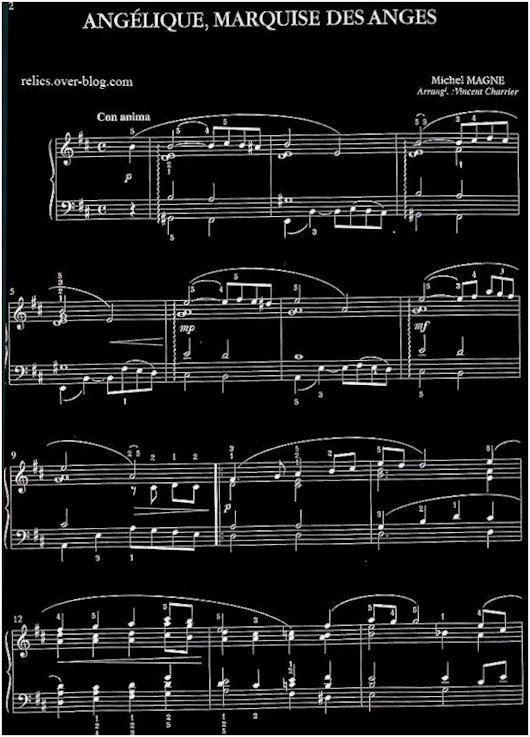
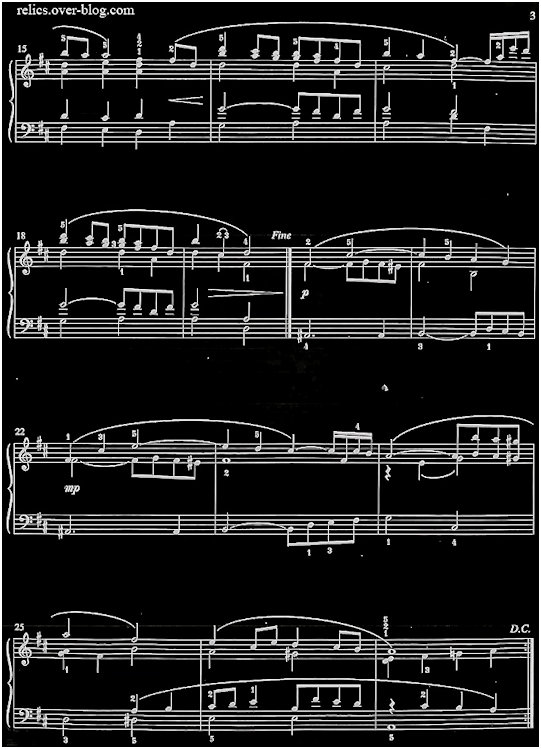
Pages from the original 1960s films of Angélique with the original score by Michel Magne (1930-1984) which I made into a negative as it is easier to see the actual score for anyone wishing to test their musical prowess - source: relicsover-blog.com
Angélique Manga T-1
Posted on Amazon on 24th April 2015 moderation approved
The statistics for the new product are not terribly positive even after 6 years, which is a shame as this is a truly beautiful work of art and keeps true to the storyline! Again, I wish it had continued. even after the death of Anne Golon, as I am sure it would have been cherished by its readers.

Like many others I was horrified at the prospect of Angélique, my heroine for over 45 years, being turned into a 'comic' - that is because I had never researched what a 'Manga' really portrays. For anyone interested, there is a lot of information on the internet about the 'Manga' style which has very specific guidelines which must be adhered to to make it a true art-form. I have now seen the first four chapters of The Angélique Manga on-line and on the strength of those ordered T-1 in hard copy format. From what I have seen, this version of the book is keeping true to the original and has met with Anne Golon's approval. French reviews are complimentary not only to the style but also to the fact that it embodies the 'spirit' of the original. Today, Angélique Manga and Anne Golon appeared in my local newspaper, the Hucknall Dispatch, because they considered the subject matter of my article worth printing. I have borrowed the title for this review from a French article - I had intended at first to call it Angélique for the 21st Century but 'Marquise du Manga' says it all.
Rejected Review :
The rejected review containing the comments that presumably fell foul of the Amazon guidelines - the following 'I am an unashamed campaigner to get the original books re-published in their entirety - including the as yet untranslated versions - and hope that the resurgent popularity of Angélique shown in France, Germany, Portugal, Russia, Greece etc. might finally gravitate to the English-speaking world!' was replaced with 'I have borrowed the title for this review from a French article - I had intended at first to call it Angélique for the 21st Century but 'Marquise du Manga' says it all.'
Like many others I was horrified at the prospect of Angélique, my heroine for over 45 years, being turned into a 'comic' - that is because I had never researched what a 'Manga' really portrays. For anyone interested, there is a lot of information on the internet about the 'Manga' style which has very specific guidelines which must be adhered to to make it a true art-form. I have now seen the first four chapters of The Angélique Manga on-line and on the strength of those ordered T-1 in hard copy format. From what I have seen, this version of the book is keeping true to the original and has met with Anne Golon's approval. French reviews are complimentary not only to the style but also to the fact that it embodies the 'spirit' of the original. Today, Angélique Manga and Anne Golon appeared in my local newspaper, the Hucknall Dispatch, because they considered the subject matter of my article worth printing. I am an unashamed campaigner to get the original books re-published in their entirety - including the as yet untranslated versions - and hope that the resurgent popularity of Angélique shown in France, Germany, Portugal, Russia, Greece etc. might finally gravitate to the English-speaking world!
Cheekily I also uploaded the Dispatch article as one of the 'subscriber pictures' - click on image to see full size.
I have now received my copies of the Manga which is smaller than it looks on the pictures provided by Nadine Golubinoff. The work contained in each of these pocket editions is remarkable! Each page is packed to the limits with images and interpretations of the story. Following a conversation with Nadine Golubinoff, she confirmed that Anne Golon was approached by the creators and artists to ask permission to reproduce Angélique in Manga form. Following on from permission being granted some changes were made which did not convey the ethos of the original and changed its meaning - it is with some relief that I can also confirm that once objections were raised by the author the proposed changes were removed and the original material restored. It is also gratifying that the Manga is based on the Intégrale and not the original versions published in the late 1950s and which were altered without the knowledge of the author.
From the Monteloup Website
Reviews as originally written by the late Harvey J Adkins, Steve Hall, Brigitte (web-mistress of the Monteloup site) and myself.
Angélique, Marquise of the Angels
Mid-17th century France: young Louis XIV is struggling for his throne, beggars and thieves haunt Paris and brigands roam the countryside...
Fifth child of a impoverished country nobleman, Angélique de Sancé grows up in the Poitou marshlands, a region known as the "Green Venice", halfway between the ocean and the forests. She is a free child, as one with the forest and the marshes, discovering nature's healing secrets with the help of the witch Mélusine. Her logical destiny would be to marry a poor country nobleman, have children and spend her life fighting for a meagre subsistence.
Destiny has other plans in store for her. At 17, on returning from her education in a convent, she finds herself betrothed to the rich count of Toulouse, Joffrey de Peyrac, 12 years her senior, lame, scarred and reputed to be a wizard.
For the sake of her family, Angélique reluctantly agrees to the match but refuses the advances of her husband. Peyrac respects her decision and does not pursue his claim to conjugal rights, wishing rather to seduce than use force.
With the passing of months, Angélique discovers the talents and virtues of her remarkable husband: scientist, musician, philosopher... and to her surprise falls passionately in love with him.
But Joffrey's unusual way of life is threatened by the ambitions of the Archbishop of Toulouse –and soon arouses the jealousy of the young king himself, Louis XIV. Joffrey is arrested and charged with sorcery.
Angélique will single-handedly take on the might of the royal court and, survive murder and poison attempts on herself in a supreme effort to save Joffrey from the stake –to no avail...
Instinctively, her whole being intent on revenge and her determination to survive, Angélique, alone and desperate, plunges into the darkness of the Paris underworld...
Wonderfully researched and written by Anne and Serge Golon, Angélique is an intricately woven tapestry of factual and fictional characters, recreating a world so vivid that the reader is enveloped in the scent of 17th century French history. Once having read "The Marquise of the Angels" there is no other choice than to continue to the end and experience the pain and pleasure of this unique fresco.
Angélique, the Road to Versailles
This is the second book of the Angélique series which has been reprinted in a large print collector's edition. One can only hope that the trend continues, as it would be a real crime if this marvelous series were to be essentially lost to future generations.
In this book, Angélique, following the death of her first husband, finds herself struggling for her and her children's very existence. Without totally giving away the story, suffice it to say that the strength of her character allows her to pull herself from the gutters of Paris to the brink of the throne of Louis XIV. How she does it is a fascinating story.
I have always found it somewhat irritating that this series is usually, in my opinion, misclassified as "romance." There most certainly is that element, but a much better categorization would be "historical fiction." Indeed, much of my knowledge of the Louis XIV era comes initially from my having read these books. The way that Anne Golon interweaves fiction with real history is one of the amazing things about not only this book, but the rest of the series as well.
One last thing. Angélique fans from years ago when the books were widely available might be interested to know that a chapter which was missing from the original English translation was added back. It is very interesting to note the completely different writing style of that chapter as compared with that of the remainder of the book.
Harvey Adkins
Angélique and the King
The sequel to "Angélique: The Road to Versailles" begins with Angélique's complex relationship with her second husband and cousin, Philippe du Plessis-Bellière, and ends with her ascendency to the title of favorite of King Louis XIV. Her relationship with the King is clouded with the knowledge that Louis years before had ordered the execution of her first husband, Joffrey de Peyrac, whom she loved dearly. I will not give away the story, as the climax is one of the great scenes in the entire series. Here again, Anne Golon's talent for mixing history and fiction shines through. The court of Louis XIV is portrayed with vivid accuracy. The reader ends up feeling that he or she really gets to know the characters, be they historical or fictional. This book has been out of print for decades, and is a real treasure for anyone's collection.
Harvey Adkins
Angélique and the Sultan (aka Angélique in Barbary)
At the end of "Angélique and the King", Angélique decides to pursue an unknown destiny - she has part of the key to the lock, but not all of it... at the start of Angélique and the Sultan she discovers ever more tasty morsels. Well, actually those morsels are for us the reader - eager to know more, but even with the surprises and little hints that we get we are still left with not a bowl of water to quench our thirst, but a colander with the water slowly yet inexorably seeping away! Aaaah! yes, it's all worthy of a scream of frustration - the desire to know more, the carrots being dangled. Then peace and tranquillity dawn once more, the authors weave their magic by taking us away from the frustrations and thrusting us into the peaceful and romantic nature of calm sea waters and blissful colours and smells emanating from the mysterious near-east - until that is the new adventure begins. We have to put our clues on hold and follow the madness with which our heroine has become entangled - we fear only for her safety, everything else can wait. But we get a few more clues at one point - clues which are so obvious we decide not to set too much store by them as they are obviously red herrings! This book, like its successors, speeds you along wanting to get to the next chapter of this overwhelming adventure that has a long way to run yet.
Anna Ludlow
Angélique in Revolt
To say this book is all about rape, pillage murder and derring-do would be putting it down unmercifully. The fact that there is such a mixture of these components makes it a fascinating if disturbing read. As with the rest of the series, I am re-reading this book with as much anticipation as the first time round - I expect it's my age - but I was convinced I knew the books inside out and on re-reading find that I have forgotten many of the subtleties the authors weave so skilfully. As usual this chapter of the series has left me spent emotionally - the book spans between 3-4 years, and even reading it as fast as I did I could feel that time-span. No, not because time was dragging but because if all those events had taken place in the week it took me to read the book, then firstly the reader would sneer and say it's not physically possible and secondly it would not have made the dramatic impact intended. Another facet of the authors magic is the moving around of the central character in as many diverse situations as is possible, raising to unimaginable heights and frightening lows with the knowledge that she is as sure-footed as the cat which proverbially lands on its feet.
The first book of the series spanned Angélique's formative years, in "Road to Versailles" there was a much shorted time-span of 1-2 years, in King the action lasts for several years, in Sultan barely a year and in this book we are looking at 3-4 years. Funny, each book is about the same length in pages!
This book also shows an entirely different facet to Angélique's character - her utter and absolute vulnerability. Up to yet, she has been invincible, despite everything or perhaps in spite of everything that she had previously undergone. Here she experiences the worst degradation a woman can undergo and loses her greatest remaining treasure, her son and heir to the Plessis estate, in the worst possible circumstances. In his place she is delivered of a bastard daughter who reminds her of everything that is worst in life - does she reject her? Yes, of course she does, it's a gut reaction - it's human nature, but less than a week later, our heroine rescues this child and despite all the contradictions going on around her and all the reasons for not wanting to bond with this reminder of her shame, Angélique takes to her child with abandon and allows her to become a part of herself in a way she had never been able to achieve with her sons.
From Poitou rebel to Puritan servant Angélique dons the mask of anonymity until a series of chance mishaps bring her face to face with Desgrez - the man from the past. I do admire how the authors manage to bring back previous characters as if they had just left the room to run an errand. At the start of this book we are re-acquainted for a short while with a playmate of Angélique - Valentine, now a miller, at the end we come across not only Desgrez but also the mystery pirate - Rescator. And so to the teasing part of the book - I mentioned at the end of my review of Angélique and the King that she had bitten the hand that tried to feed her - she has managed in this book to elude the king - although there is a delicious moment in the heat of battle when she sends him a message saying "Trifle wishes to be remembered kindly" - how about that for rubbing salt into wounds? Revenge tactics with Rescator are not so easy - she cost him a pretty penny in Candia (Angélique and the Sultan/Barbary)- and it is him she has to seek out to help her and her friends to escape.
Rescator the enigmatic, agile as a monkey (now where have I read that before? -surely when Joffrey was fighting a duel for her and his agility was remarked on in spite of his terrible disability). Rescator who hides his face ("they" reckon because he has terrible scars - now where have I read that before?). Rescator who favours wearing black - OK not much of a clue. Rescator who is known as a Sorcerer (now where have I heard that before? - who was it who was burned at the stake as a Sorcerer?). Rescator who walks without a limp and is sure-footed on the boards of his ship - oh bother, doesn't that just throw the whole equation out of the window - it doesn't add up does it? The voice is pretty disappointing too, apparently it is very gravelly. But what about the sarcasm? The cutting thrusts, the knowledge and curiosity he has about this woman who is destined to meet him again - Osman Faraji said so - and he was a seer. OK - so, I'm about to read the next stage of this heady and intoxicating series - nothing is going to stop me now .... how about you?
Anna Ludlow
The Countess Angélique
Shakespeare wrote it first, Aldous Huxley borrowed it and wrote a fantastic (in its literal sense) novel - Angélique is about to experience all the wonders that the New World has to offer. At last, after all this time the Count and Countess de Peyrac have the opportunity of being together as man and wife, last experienced by them for so short a time in "Marquise of the Angels".
This book starts deceptively, it heralds the safe arrival, across the treacherous ocean, of a united family. Wife finds husband, husband finds new daughter, mother re-unites with sons, one of whom she thought dead. The makings of happiness of a delirious nature - it doesn't last long, there would be no story if it did. First of all, there is the matter of two adults who have not seen each other for 15 years needing to re-establish a norm. Too many preconceived ideas that have not yet been explained. Then there is a child whose past is not clearly defined, but for the sake of the mother who is devoted to the child, Joffrey de Peyrac accepts this independent being, so desperate for a father, as her own.
We move on to experience the wonders of the New World in vivid description, colours jump out of the printed page, smells surround the reader. But, not all is new - the sinister undercurrent of the Old World manifests itself from a distance and hearsay - a Jesuit, a man unknown to them is waging his own private persecution of the Peyracs, the circle is complete. Now, not only do the Peyracs have to fight to survive in the most literal sense, hostile natives, the long, long winter and the loss of their meagre supplies -but also the invisible menace of the Inquisition. Plenty of food for thought and more "trailers" of things to come as references are made to what is happening in Québec, morsels of information about kidnappings and the build-up of relationships with the Chieftains who will in due course play a large part in their lives - the adventure continues apace.
Anna Ludlow
The Temptation of Angélique
Hardly a moment to gasp as Angélique launches herself across 17th Century Maine, propelled by misinformation and separated from her beloved husband into peril - Indian ambush, capture, escape, shipwreck, encounters with buccaneers, and finally an old flame from the past.
In spite of resisting temptation - just -, Angélique finds herself estranged from her husband through treachery and plots by her enemies.
But character and true love overcome the obstacles, only for a new and dangerous development at the end of the book to put a fly in the ointment and leave the reader hanging out to find out what happens next.
Yet another masterpiece.
Steve Hall
Angélique and the Demon
The 8th book in a compelling saga chronicling the life of Angélique, born into impoverished, but devout Catholic nobility. The 5th child of the de Sancé enters the world a year before the birth of Louis XIV whose influence will shape her eventual destiny and link her to him from the moment she marries Joffrey, Count of Toulouse.
Angélique, child of the Poitou marshes, is at one with nature, embracing unquestioningly all its mystical and healing powers.
Without realising her destiny, Angélique is already forging links with the supernatural, links which will help her to survive when she is exposed to the Demon – Ambroisine de Maudribourg.
Ambroisine, child of Satanic ritual, is the embittered product of a clandestine relationship between Priest and Poisoner, imbued with all the inherent cruelty that can only be fostered by such a union.
Ambroisine, the predator, brings with her all the malevolence of the Old World, of the Kingdom of France, from which the principals had endeavoured to escape. She mesmerises her prey, sets families and friends apart and sews seeds of doubt in beliefs previously held inviolate. She lives to "divide and conquer" –her ultimate goal: to destroy the community which has strived so hard to survive.
Pitting two such forces against each other, in the untouched and unspoilt setting of their "Brave New World" inevitably escalates into the unavoidable confrontation of good against evil.
The authors weave so intricate a plot that it is difficult to avoid the tendrils that insinuate themselves into the readers consciousness. An exhausting exercise best served by wallowing in its consummate artistry and permitting oneself to be drawn into the inevitable spiral of suspense from which there is a long climb back into the light. But, can anyone be sure that there is a safe haven at the conclusion of this chapter?
As with the preceding and succeeding books in this series, one can never be quite sure if the subject of the moment has truly been concluded or whether somehow, somewhere, when least expected it might just, once more creep up from nowhere... and overwhelm the readers senses with delight, despair and hope.
Anna Ludlow
Angélique and the Ghosts
A more complex book than its predecessor (Angélique and the Demon, which was pure adrenaline), Angélique and the Ghosts sees shadowy figures from her past appearing, perhaps by chance, perhaps through the influence of shadowy influences from mother France.
Who is pulling the strings, and why? Are they friends or enemies, or both? How will Angélique's old relationships and new-found friends affect the mission to make peace with the administration of New France in Quebec?
The subtle interplay of the various relationships almost disguises the fact that the book contains a great deal of action. Unlike the previous book, which came to a conclusion of sorts, while opening up beginnings, this book is full of beginnings.
At the end, you are gripped by the characters, and eager to learn what happens next - and I STILL DON'T KNOW - 20 years after I first read this book - because the next three books haven't been translated into English.
The minute I finished this book for the first time, I knew there would be a sequel, and that it would be called Angélique in Québec. It took me 15 years to find it, and when I did, it was in French.
It still sits on my bookshelf, loved but unread. I can't wait for the day, surely to come soon, when it and its two sequels are finally translated into English.
Steve Hall
Page refreshed : 14th April 2021 (G)



